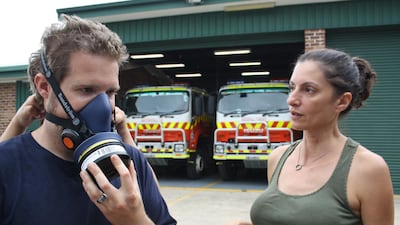Palestinian-Lebanese Australian Ophelia Haragli and her friends have raised donations to buy and distribute more than 1,500 high-quality breathing masks to volunteer fire fighters tackling Australia’s fire crisis.
Ms Haragli, who is a cousin of Dubai TV presenter Sahar El Mizari, has been buying and distributing the masks across the state of New South Wales for the past two weeks, sometimes spending 10 hours on the road each day to reach isolated communities in dire need of protection from smoke inhalation.
"People have the P2 masks, which are basically paper — they're not enough, they don't offer enough protection," she told The National.
Ms Haragli, who lives in Sydney, started the project under the auspices of her organisation My Sister’s Keeper, which her brother founded when she was diagnosed with breast cancer at the age of 31.
“When I was diagnosed I didn’t know anything about breast cancer. My brother started it and I took it over, it’s a free voluntary information and support service,” she said.
The masks, manufactured by Sundstrom, filter out dangerous particulates and smoke, and come with an additional filter to protect firefighters from other gases.
After making contact with Michael Serret of S.E.A., Sunstrom’s distributor in Australia, Ms Haragli was put in touch with Allen’s Industrial Products, a family-owned business who agreed to supply the masks at a greatly reduced price.
Ms Haragli said she believes the company has given up about AUD$100,000 in profit to support the project.
At least 28 people have been killed and thousands of homes destroyed since the bushfires began in September.
On Sunday, Australia's Prime Minister Scott Morrison apologised for his handling of the crisis ravaging the country. He admitted there were things he "could have handled on the ground much better" and acknowledged the pressure fire services were facing.
He said there was a "new appetite" for the government to take a more direct role in responding to the disaster.
Mr Morrison has faced mounting criticism over his government's response to the bushfires and its climate policy. He has been heckled by locals when visiting fire-hit communities in New South Wales and also Victoria, where the worst blazes are concentrated.
Matt Walton, a member of the Waterfall Rural Fire Service, which is based about 40 kilometres south of Sydney, said fire service workers have been working 12-hour days and through their holidays to tackle the fires.
“All of our senior members are saying they have never seen anything like this," he said.
"The other day in Bermagui (in New South Wales), it just turned pitch black like midnight in the afternoon and ash was falling from the sky.
Any AQI of 200 is considered hazardous and the low end of the worst category of air quality. The air in Canberra, in the Australian Capital Territory, within New South Wales’s south east, exceeded 4,200 last Sunday.
Over 100,000 people have signed a petition from the Firefighter Cancer Coalition calling on the Premier of New South Wales to provide better breathing masks to firefighters.
Peter Kneale, captain of the Waterfall Rural Fire Service, has been fighting fires for 43 years and
said that in more than four decades of service he had never seen anything like Ms Haragli’s drive to distribute breathing masks — for free — to firefighters.
“We are not complaining about the equipment we have but these are 1000 per cent better than what we have got for breathing protection,” he said.
“We really appreciate what she is doing,” adding that certain building materials made smoke inhalation particularly dangerous. “A lot of the older houses had asbestos in them.”

